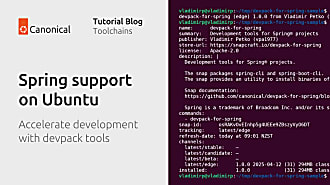Thibaut Rouffineau
on 26 September 2016

Canonical joins Linaro as one of the founding members of the LITE project, fostering collaboration and interoperability in the IoT and embedded space.
“Linaro the collaborative engineering organization developing open source software for the ARM® architecture, today announced the launch of the Linaro IoT and Embedded (LITE) Segment Group. Working in collaboration with industry leaders, LITE will deliver end to end open source reference software for secure connected products, ranging from sensors and connected controllers to smart devices and gateways, for the industrial and consumer markets.” states the press release issued today by Linaro today.
This latest initiative by Linaro is aimed at facilitating the creation of more interoperable solutions in the ARM embedded space. The need for LITE emerges from the experience of many in IoT, who struggle with the variety of options at all levels of the software stack from sensors to gateways, from OS to middleware.
Canonical is a long time supporter of Linaro initiatives. For example, 96Boards was created to promote the creation of more standard ARM 64 bits boards. Canonical has partnered with a number of ARM vendors building 96 Boards (Qualcomm, Lemaker, ucRobotics). But this is the first time that Canonical joins Linaro and one of their projects as a member.
Canonical’s motivation reflects our commitment to creating the conditions for faster hardware and software development in IoT through the use of interoperable open source solutions.
Snap the universal packaging format for Linux was launched in May as part of Ubuntu 16.04 for developers to take the same piece of software and quickly deploy it across server or edge gateways. A good example of this is Rocket.chat, a server based solution that used to take 3 hours for network administrators to deploy and can now be deployed by any user on a home Raspberry Pi in just a few minutes.
In June, it was announced that snaps were available across a series of Linux distros from Yocto to openWRT. This gives developers and device makers a wide choice of OS and hardware and creates interoperability at the OS level.
Finally Ubuntu Core, the version of Ubuntu built for IoT, based on an all-snap architecture, is bringing the interoperability, simplicity and manageability of snaps to help anyone building an IoT device a faster route to market. The recent launch of the NextCloud box is a great example here. Nextcloud used their existing server based software packaged as a snap, standard hardware (Raspberry Pi & Western Digital SSD), Ubuntu Core and a standard kernel for the Raspberry Pi to build their solution. By using standard and interoperable components they were able to go from prototype to a commercial device in just a few months.
Canonical looks forward to joining Linaro and LITE, we’ll be at Linaro Connect all week if you want to meet!



